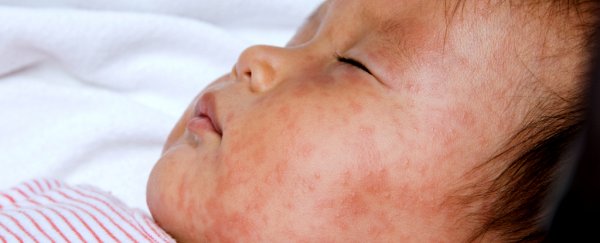The state of Arizona is currently reporting the US's biggest measles outbreak of 2016, with more than 22 confirmed cases in the state since May.
That might not sound like a lot, but before that there had only been 19 measles cases reported in the entire country this year - so the outbreak has effectively doubled the incidence of the disease.
If the outbreak gets worse, health officials will likely ask the governor of Arizona to declare a state of emergency, Samantha Olson reports for Medical Daily.
Despite the fact that measles affects more than 20 million people around the world each year, it's relatively rare in the US thanks to an effective vaccination program developed in the '60s.
In fact, measles was officially eliminated from the US in 2000, which means it no longer occurs naturally within the country's borders.
But it can still be brought in from travellers overseas, and due to a recent drop in immunisation rates - thank you anti-vaxx movement - there have been several outbreaks over the past few years.
Most notably in California in 2014, when an unvaccinated visitor to Disneyland caused 84 cases of the disease across 14 states.
The epicentre of this latest outbreak has been traced back to the Eloy Detention Centre in Arizona's south. The initial carrier was most likely a migrant, but it appears to have been spread by unvaccinated employees at the facility, as Phil Plait reports for Slate.
While detainees at the centre have now been vaccinated, many of the staff have apparently refused, or failed to show proof of vaccination, for reasons that aren't yet clear - but it might have something to do with the ideas spread by anti-vaccination groups.
Despite studies involving more than 95,000 children showing that vaccines aren't linked to increased risk of autism, anti-vaxx groups continue to perpetuate that myth online - along with a range of other arguments against immunisation, which have been thoroughly debunked time and time again by the scientific evidence.
But why does it matter if some people choose to forego vaccinations if everyone else is protected?
The reality is that no vaccine is 100 percent effective for everyone, and not everyone can be vaccinated. Newborns and people with compromised immune systems - such as those going through chemotherapy or with autoimmune conditions - aren't able to be immunised.
Thanks to something called herd immunity, as long as around 95 percent of the population is vaccinated, these vulnerable groups will stay protected due to the fact that the virus isn't able to take hold and spread in a region.
But when those overall immunisation rates fall, the disease can quickly break out - which is what is happening now.
In fact, measles is so contagious that 90 percent of unvaccinated people will catch the virus if they're around an infected person.
And it's easy to forget - now that the disease isn't so prevalent - how bad it can be. In addition to a rash and fever, measles can lead to serious complications, such as encephalitis, blindness, and even death.
Let's hope the people of Arizona protect themselves and stop the spread of this latest outbreak before anyone is seriously harmed.
